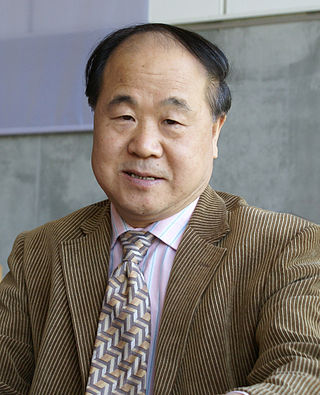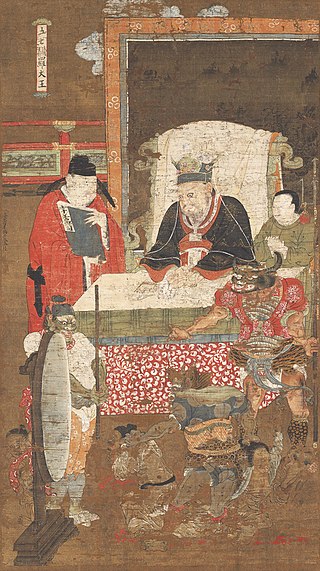
Shanxi is an inland province of China and is part of the North China region. The capital and largest city of the province is Taiyuan, while its next most populated prefecture-level cities are Changzhi and Datong. Its one-character abbreviation is 晋, after the state of Jin that existed there during the Spring and Autumn period.

Penn Yan is an incorporated village and the county seat of Yates County, New York, United States. The population was 5,159 at the 2010 census. It lies at the north end of the east branch of Keuka Lake, one of the Finger Lakes. Penn Yan, New York is home to one of the oldest mills in the United States, The Birkett Mills, founded in 1797.

Yan Xishan was a Chinese warlord who served in the government of the Republic of China. He effectively controlled the province of Shanxi from the 1911 Xinhai Revolution to the 1949 Communist victory in the Chinese Civil War. As the leader of a relatively small, poor, remote province, he survived Yuan Shikai, the Warlord Era, the Nationalist Era, the Japanese invasion of China and the subsequent civil war, being forced from office only when the Nationalist armies with which he was aligned had completely lost control of the Chinese mainland, isolating Shanxi from any source of economic or military supply. He has been viewed by Western biographers as a transitional figure who advocated using Western technology to protect Chinese traditions, while at the same time reforming older political, social and economic conditions in a way that paved the way for the radical changes that would occur after his rule.

Yan was an ancient Chinese state during the Zhou dynasty. Its capital was Ji. During the Warring States period, the court was also moved to another capital at Xiadu at times.

Yan, known in historiography as the Former Yan, was a dynastic state of China ruled by the Murong clan of the Xianbei during the Sixteen Kingdoms period. From Liaoning, the Former Yan later conquered and ruled over Hebei, Shaanxi, Shandong and Henan at its peak. They were notably the first of several Xianbei states to have establish their rule over the Central Plains. The prefix of "Former" is used in historiography to distinguish them from the other Yan states that came after them such as Later Yan.

Yan, known in historiography as the Later Yan, was a dynastic state of China ruled by the Xianbei people during the era of Sixteen Kingdoms.

Yan, known in historiography as the Northern Yan, Eastern Yan or Huanglong, was a dynastic state of China during the era of Sixteen Kingdoms. Some historians consider Gao Yun, a member of the Goguryeo royal family, to be the first Northern Yan monarch, while others consider Feng Ba of Han ethnicity to be the founder.

Guan Moye, better known by the pen name Mo Yan, is a Chinese novelist and short story writer. Donald Morrison of U.S. news magazine TIME referred to him as "one of the most famous, oft-banned and widely pirated of all Chinese writers", and Jim Leach called him the Chinese answer to Franz Kafka or Joseph Heller. He is best known to Western readers for his 1986 novel Red Sorghum, the first two parts of which were adapted into the Golden Bear-winning film Red Sorghum (1988).

The Yan Emperor or the Flame Emperor was a legendary ancient Chinese emperor in pre-dynastic times. Modern scholarship has identified the Sheep's Head Mountains Weibin District, Baoji as his homeland and territory.

Yan Zi is a retired Chinese-Hong Kong tennis player.

In East Asian and Buddhist mythology, Yama or King Yan-lo/Yan-lo Wang, also known as King Yan/Yan Wang, Grandfatherly King Yan, Lord Yan, and Yan-lo, Son of Heaven, is the King of Hell and a dharmapala said to judge the dead and preside over the Narakas and the cycle of saṃsāra.

Jurodidae is a family of beetles that was originally described for the extinct genus Jurodes, known from the Middle-Late Jurassic of Asia. In 1996, a living species, Sikhotealinia zhiltzovae was discovered in the Sikhote-Alin mountains in southeastern Siberia, and assigned to this family. Their placement is uncertain, but are usually considered archostematans. In one study, Sikhotealinia and Jurodes were considered a sister group to all other archostematan beetles. However, other authors have considered their placement within beetles as a whole uncertain, due to their mix characteristics of typical Archostemata, as well as Polyphaga and Adephaga.

Yan-gant-y-tan is the name of a demon from Brittany, France.

Saint-Yan is a commune in the Saône-et-Loire department in the region of Bourgogne-Franche-Comté in eastern France.
The Nhangu language (Nhaŋu), also Yan-nhaŋu (Jarnango) is an Australian Aboriginal language spoken by the Yan-nhaŋu people, inhabitants of the Crocodile Islands off the coast of Arnhem Land, in the Northern Territory of Australia. The Yan-nhaŋu language belongs to the Yolŋu Matha language group of the Yolŋu people of Arnhem Land in northern Australia. The varieties of the two moieties are (a) Gorlpa and (b) Yan-nhangu.
The Sixteen Kingdoms, less commonly the Sixteen States, was a chaotic period in Chinese history from AD 304 to 439 when northern China fragmented into a series of short-lived dynastic states. The majority of these states were founded by the "Five Barbarians", non-Han peoples who had settled in northern and western China during the preceding centuries, and had launched a series of rebellions against the Western Jin dynasty in the early 4th century. However, several of the states were founded by the Han people, and all of the states—whether ruled by Xiongnu, Xianbei, Di, Jie, Qiang, Han, or others—took on Han-style dynastic names. The states frequently fought against both one another and the Eastern Jin dynasty, which succeeded the Western Jin in 317 and ruled southern China. The period ended with the unification of northern China in 439 by the Northern Wei, a dynasty established by the Xianbei Tuoba clan. This occurred 19 years after the Eastern Jin collapsed in 420, and was replaced by the Liu Song dynasty. Following the unification of the north by Northern Wei, the Northern and Southern dynasties era of Chinese history began.

He Yan, courtesy name Pingshu, was a Chinese philosopher and politician of the state of Cao Wei in the Three Kingdoms period of China. He was a grandson of He Jin, a general and regent of the Eastern Han dynasty. His father, He Xian, died early, so his mother, Lady Yin, remarried the warlord Cao Cao. He Yan thus grew up as Cao Cao's stepson. He gained a reputation for intelligence and scholarship at an early age, but he was unpopular and criticised for being arrogant and dissolute. He was rejected for government positions by both emperors Cao Pi and Cao Rui, but became a minister during the rule of Cao Shuang. When the Sima family took control of the government in a coup d'état in 249, he was executed along with all the other officials loyal to Cao Shuang.

Yan Mingfu was a Chinese politician. His first prominent role in government began in 1985, when he was made leader of the United Front Work Department for the Chinese Communist Party (CCP). He held the position until the Politburo expelled him for his sympathies with the 1989 Tiananmen Square protestors. Yan returned to government work in 1991 when he became a vice minister of Civil Affairs.

Yan Bingtao is a Chinese former professional snooker player who is currently serving a five-year ban from professional competition after committing a range of match-fixing offences. He rose to prominence by winning the ISBF World Snooker Championship, the sport's world amateur title, in 2014 at age 14, which made him the tournament's youngest ever winner. He turned professional in 2016.

Petr Evgenyevich Yan is a Russian professional mixed martial artist. He competes in the Bantamweight division of the Ultimate Fighting Championship (UFC), where he is a former UFC Bantamweight Champion. Yan formerly fought in Absolute Championship Berkut where he is a former ACB Bantamweight Champion. As of 16 April 2024, he is #3 in the UFC bantamweight rankings.

















